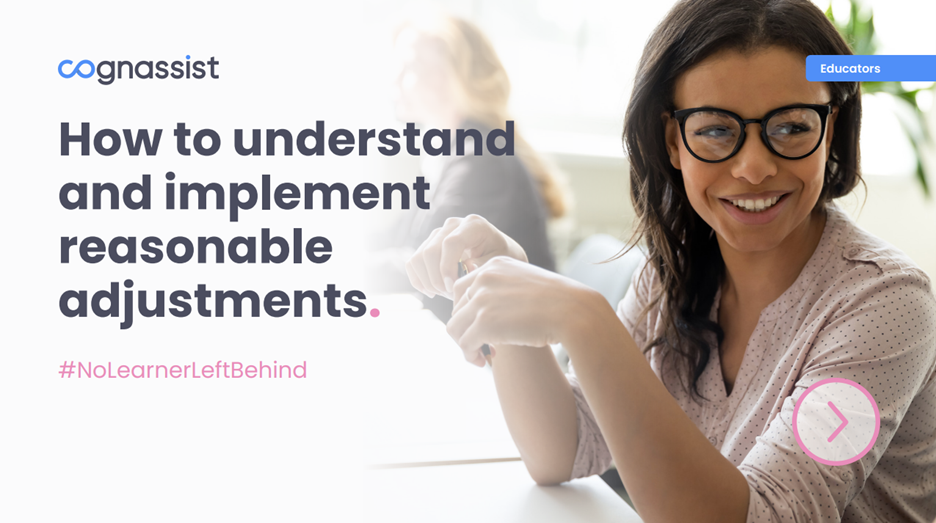How to implement reasonable adjustments: Expert Q&A
What a start to our Reasonable Adjustment Series!
We had some incredible discussions with our panellists last week and a huge amount of questions and engagement from our audience.
Thank you all for being part of the conversation. It was great to hear from:
Charlotte Bosworth, Managing Director at Innovate Awarding.
Carl Harper, End-point Assessment Manager at Realise.
Stewart Segal, former AELP CEO and Chair at Youth Employment UK.
Dr Louise Karwowski, Director of Education at Cognassist and our host.
And of course, great to hear from our audience!
This first panel was all around Implementation and you can catch the full event on demand now.
But for those in need of a quick fix, here’s just some of the highlights…
Take me to the audience Q&A or keep scrolling to hear from our expert panel first…
Why do you think there is such a problem within the
industry where organisations just aren’t addressing this issue?
Charlotte: I quite often think, and Louise we’ve discussed this in depth before…
How do we actually get people not to assume and recognise the diversity of apprentices and learners?
And that’s not just about level.
I think it goes across all levels and ensures that when things are developed and considered from the outset, that there are reforms.
That actually, the consideration for the diversity of learners is included in that thought process and that development process.
Stewart: I would absolutely agree.
And frankly, not being unkind, but most providers tend then to structure their programmes around the rules. And because the rules are not very clear on reasonable adjustments, they can sometimes get forgotten.
So don’t think it’s a matter of people not caring or not wanting to do it. It’s a pretty tough, complex sector.
And anything that sort of complicates the day to day, I think that is tough for training providers to deal with.
I think one of the issues for me that we’ve talked about Louise, it’s about changing that round and making reasonable adjustments as a way of managing the complexity. Not as an addition to the complexity.
That’s where we’ve never got to.
We’ve never got to that point and it’s always seen as a bit of a complication.
As it is seen that way by those that set the rules, the ESFA and the government.
I don’t think they’ve ever seen that adjusting to disabilities, changes and differences is a better way of delivering it than trying to structure it very closely.
Well said, Charlotte and Stewart!
And setting a standard for reasonable adjustments in the education industry is a hugely important task.
A recent survey that we sent out to AELP members showed that only 8% of people said they are very confident in implementing reasonable adjustments.
We are on a mission to change this and so are many providers…
Our client Inspire Learning and Employment have achieved 100% completion rate for learners identified with needs, which is incredible!
We’re sure a lot of that is down to Carl and his work as their End-point Assessment Manager.
So what was Inspire’s motivation in creating your role
and how did you achieve this amazing result?
Carl: Yeah, I guess my role was created not really on the back of reasonable adjustments.
It was on the back of the fact that we deliver 19 standards and we work across multiple EPAOs, which isn’t always our choice but we do!
So managing that effectively is quite a challenge.
Especially when different EPAOs have different ways of doing things.
You have to be able to be on top of it and make sure the right reasonable adjustments form goes to the right EPAO. Checking that the application has been received and checking it’s been accepted or if you need to appeal it.
There’s lots of processes involved.
So for me, it was about getting our house in order first before we could make it right going forward.
So I had to put our own internal reasonable adjustments policy in place and put out that support and training to all the on programme assessors and performance managers.
We pulled the [end-point assessment reasonable adjustments] guidance and matrix and brought it into our own organisation.
To make sure that the reasonable adjustments process was embedded throughout our organisation.
Because if it’s not and it’s just a tag on, something that you do at the end or something where you think “oh, we need to do that”, it’s not going to work.
You have to embed it throughout and everyone needs to be aware of the process from the beginning.
[To view the guidance and some more of Carl’s best practices around reasonable adjustments, you can download our free handbook. Hopefully it gives you some handy tips!]
Audience Q&A
We had lots of follow-up questions from our audience and couldn’t quite fit them all in.
So here’s the ones we couldn’t include…
What happens if a reasonable adjustment has not been known or applied for
during the on-programme time and becomes apparent at EPA?
Unfortunately, it would be very difficult if not impossible to arrange a reasonable adjustment at the last minute.
That’s why the best practice of early identification is key to ensure all learners have the best chance at success.
As we conduct assessment for functional skills and prior learning,
to meet the requirements of the Equality Act 2010, who is currently
leading the way to change the rules on Cognitive assessment?
Currently, we are working in collaboration with Mencap, the ESFA and IfATE to change the Government rules around cognitive assessments.
To make it a requirement that any apprentice who needs or asks for a cognitive assessment can be given one by their training provider.
We are incredibly passionate about this work and continue to push our recommendations forward.
[You can find more details in Mencap’s 2019 Access All Areas report.]
Can you confirm that the funding for reasonable adjustments is applicable for community learning as well as any accredited learning?
We are ESFA funded and have directive around how we use our AEB with a separate budget for Skills
Absolutely!
A nice, simple answer for this one.
Can you claim retrospectively then please in any academic year
as long as you have the proof of those early discussions and support in place?
Unfortunately not.
Funding can only be claimed during the “To” and “From” dates stated on a learners ILR (Individualised Learner Report).
It is also claimed on a monthly basis.
To receive Learning Support Funding or Adult Education Budget support, the learner must be receiving support on the last day of that calendar month and any evidence must reflect this.
You cannot claim retroactively, even if you have this evidence of learner support.
We work closely with providers to help them claim proactively and make the evidencing and claiming process as smooth as possible.
When we ask our learners if they need additional support,
they expect a menu of choices. Does this exist?
Yes, we are all about personalising support provisions to suit each learner.
Our platform gives learners access to monthly strategy modules, which gets them to think about helpful coping mechanisms and allowing them to decide what works for them and what doesn’t.
We also automatically provide appropriate reasonable adjustments at the start of a programme based on the needs of that learner.
So between the tutor and the learner, they can decide the best approach within the reasonable adjustment guidance and beyond.
What do I do in the instance where at the moment, there are no
paper-based assessments being issued by the exam board we use due to Covid?
I have a learner who requires paper-based and they cannot complete their Functional Skills assessments.
There was a recent announcement on Functional Skills.
Firstly, we’re bound to provide paper-based test if someone requires, so you can definitely challenge that.
But the announcement said that the DfE want Functional Skills programmes to continue and they’ll be providing the funding to transport individuals to a site to complete paper-based assessments.
Funding can cover the cost of travel, invigilation and site hire.
You will need to go back to your EPAO if that’s the identified adjustment.
How do you coax the information from the learner, especially as an
EPAO who has little/no knowledge of the learner?
Not all training providers provide detailed information
As an EPAO, you can have conversations with your providers ahead of End-Point Assessment around reasonable adjustments.
Providers may ask you which reasonable adjustments should be applied on a case by case basis.
So you should have a solid knowledge on what reasonable adjustments can be applied in which cases and make sure that your EPOA has a policy in place to ensure reasonable adjustments are applied for, fit the circumstances and if so are enacted on the day of assessment.
But you’re not mind readers and it is the job of the training provider to have that knowledge of learners and know when to implement reasonable adjustments in the first place.
This is where we’ve made sure that our process ensures providers have enough information.
We’ve built a framework for providers, which allows them to work with us to identify the best type of adjustment.
We train all our assessors on these.
We have had external parties come in to train our assessors for how they then apply that adjustment to that learner.
We put a lot of emphasis on training and paperwork so it’s on the provider when they put adjustments in place before Gateway.
And that’s it!
If you want more of your questions answered, you can check out the full event on demand.
But wait… There’s more
You can also read about the next panel in the series on compliance to get answers from the ESFA and Institute for Apprenticeships & Technical education.

Helen
Science Communications Manager
Download our free handbook
You’ll learn:
- Where reasonable adjustments have the most impact for learners.
- The matrix for identifying the best reasonable adjustments to drive learner success.
- Guidance to create a successful application for your awarding organisation.
- Best practices on evidencing and execution.

